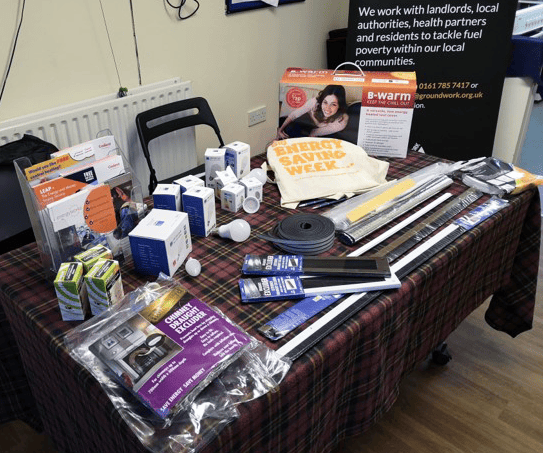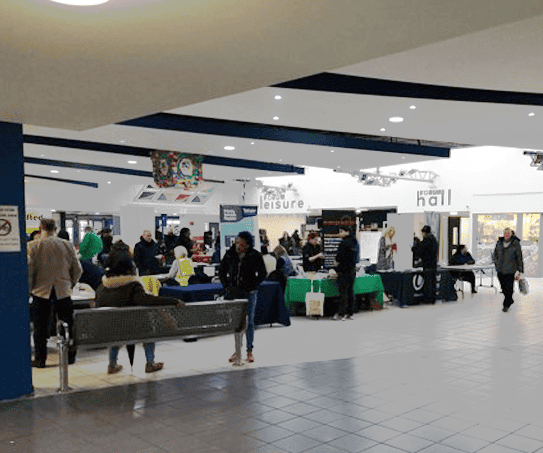Europe's households endured one of the toughest winters this past season. The spike in energy costs have had devastating impacts on many people across the continent, often forcing them to choose between heating or eating. Energy poverty is a multifaceted issue which has detrimental effects upon a person's health and wellbeing. Its causes and effects vary from region to region across Europe and a household's energy consumption can be significantly impacted by determinants such as population growth, climate change, infrastructure issues, and political unrest.
But all is not lost. The rise of Energy Cafés has provided energy experts with the unique opportunity to help people increase their energy efficiency, by providing cost-saving strategies and advice in an informal, open, and inclusive setting - empowering those who are most vulnerable. Dr Neil Simcock, Senior Lecturer at the Liverpool John Moores University explains the impact of such initiatives and lessons learned.
Since late-2021, significant increases in the price of domestic energy has plunged millions of households into “energy poverty” – a situation where people are unable to afford to use the energy they require to meet basic needs, such as heating, cooking, and bathing.
In October 2021 it was estimated that 4.5 million households in the United Kingdom (UK) were suffering from this problem, but sadly, this has since risen dramatically to 7.5 million households as reported by National Energy Action. But what is the impact of such poverty? Experiencing energy poverty is known to have profound and detrimental impacts upon people’s lives, including harms to mental health and the exacerbation of respiratory and circulatory illnesses. As energy poverty primarily affects disadvantaged households, it aggravates (health) inequalities between richer and poorer groups. We need to urgently find solutions to this ongoing crisis.

Living Labs
Between 2018 and 2021, the Horizon 2020 funded project, STEP-IN - a project that worked to develop a global methodology for the effective analysis of energy poverty - worked with three European communities, namely, Hungary, Greece, and the UK to alleviate the effects of this poverty.
The project adopted a 'living lab' approach to assess local level energy poverty and improve strategies in targeted regions by testing and refining different ways to provide support that could help people keep their energy costs affordable and their homes warm and comfortable.
As energy poverty significantly affects those who are economically vulnerable, urban areas were a point of focus due to the large number of underserved communities who inhabit these areas. One of the living labs operated in the Greater Manchester (GM) area of the UK - a metropolitan region known for facing deep challenges related to poverty and inequality, and a region that is home to an estimated population of around 2.7 million people.
Advice and information on reducing energy consumption and costs was provided through multiple means - both both online and offline - including a website and popular multimedia platforms such as YouTube as well as using more traditional communication streams such as leaflets, and information sheets. However, the in-person advice consultations were perhaps the most significant as trained experts from the charity Groundwork, visited individual homes to provide detailed and personalised guidance on how to lower energy costs.
Creating open environments
Utilising settings where people could receive guidance from experts who understood their needs was crucial to the project. One particular action – the 'energy cafés' - exemplified this. Energy cafés involve the provision of energy-saving advice in public and community spaces - completely free of charge. The idea is that expert energy advisors host an open stall, populated with information leaflets and energy saving “gadgets”, chatting with passers-by and stall visitors. Sometimes the cafés are hosted at larger community events (usually not with an “energy saving” theme) that involve entertainment and activities or are otherwise located in busy and well-known community spaces with many serving refreshments such as tea and cake with the aim of making the event relaxed and informal.
As part of STEP-IN, we held a total of 10 energy cafés in Greater Manchester, which were collectively visited by around 271 people. We surveyed attendees and conducted observations of these energy cafés to ascertain their potential benefits in the fight against energy poverty.
Impact
The cafés were highly positively appraised by the visitors we surveyed. More than 90% of respondents said they found the information useful, and they thought favourably of the advisors' ability to communicate clearly and their ability to be trusted.
Despite this, the main learning benefit for attendees of the cafés did not relate to a greater understanding of how to reduce energy costs as the advice provided to individuals was often relatively brief and generalised due to the number of attendees and collective nature of the cafés. Without the time to have an in-depth discussion with individual’s about their particular circumstance, and not being able to visually inspect their dwelling, it was difficult for advisors to provide detailed and specified guidance.
But what the energy cafés did provide was the opportunity for visitors to learn about other services that could assist them in reducing their energy costs. In particular, the cafés were vital in raising awareness about the one-to-one advice consultations conducted by Groundwork that provided more detailed and tailored advice on reducing energy costs. Over half of the visitors stated that they had arranged one of these consultations during or following the energy café event.
The graph below illustrates the impact such initiatives can have in empowering people, with an overall positive response to the question: "Will you take any action or do anything different due to what you have learned at this event?"

Building trust
We also found that energy cafés can play an important role in building trust in the organisations who provide energy advice. For people to accept an energy advisor into their home, and for them to act upon the guidance they are given, it is crucial that they trust the person and organisations providing the advice. Energy cafés allow people to meet and chat with energy advisors in an informal and relaxed setting, where they can learn about the organisation and the work they do. A crucial part of this trust-building process is for the advisors to engage energy café visitors in informal conversation and ‘small talk’. The location of the energy cafés was also important, with some visitors commenting that hosting the events in well-known community centres, and partnering with prominent neighbourhood organisations, reassured them about the legitimacy of the advisors.
Several visitors to our energy cafés also stated that they enjoyed the social aspects of the events – the opportunity to meet and interact with others in their community. This suggests that the value of energy cafés goes beyond only the provision of advice relating to energy costs, and that they may also contribute to combating loneliness and social isolation that themselves pose risks for mental illness according to a systematic review in the BMC Psychiatry.
Challenges
STEP-IN was greatly impacted by the COVID-19 pandemic. For much of 2020, the project could no longer provide in-person assistance to communities in Greater Manchester, and so home visits and energy cafés were effectively cancelled, and work had to switch to “remote” and online methods. This proved challenging, particularly for the energy cafés. To replace the face-to-face version of these events, we created and implemented an online instant messaging system that enabled visitors to chat with Groundwork energy advisors. However, despite widespread advertising, the public engagement with this system was extremely limited in comparison to the in-person cafés.
One possible reason for this lack of engagement is that those who are most likely to use and benefit from energy cafés are also often those who are less likely to use an online system – such as older people, or those who are digitally excluded. A second reason is that, as mentioned, a degree of trust is a crucial for people to accept and respond positively to energy advice. Whilst in-person energy cafés enabled trust and understanding to be built, the online system we operated did not provide the same opportunities and advisors remained relatively anonymous.


Key lessons
Ultimately, we found that energy cafés can play a crucial role in empowering people to understand the options and support available to them, allowing them to take the first step in a process of seeking advice and taking energy-saving actions. This is especially important for those who might otherwise struggle to access support and advice services, such as those who are digitally excluded or socially isolated.
There are several lessons for best practice that can inform the future use of energy cafés:
- In-person events remain the optimal way of undertaking energy cafés, while online or remote versions remain more challenging.
- Those hosting energy cafés should take steps to develop trust and understanding with café visitors, such as by engaging in “small talk” and not pressuring visitors to commit to anything. This is crucial for increasing the chances that advice will be listened to and acted upon.
- To maximise engagement and foster trust, energy cafés should be hosted in well-known and -used community hubs and should be organised with and through existing community groups. Tagging energy cafés on to wider public events, rather than creating a single standalone event purely about energy saving, can also help to increase attendance and reach groups that would otherwise not attend.
- Energy poverty can often be the “tip of the iceberg” when it comes to the hardships faced by many, and its causes can be complex and deep-rooted. It is therefore crucial to see energy cafés as one small part of a much broader, ambitious, and long-term package of measures, backed up by state financing and regulation, that addresses the underlying causes of energy poverty. One element of this could be a “national energy advice service”, that provides widely accessible, free support for anyone who needs it.

Dr Neil Simcock
Dr Neil Simcock is a Senior Lecturer in Geography based at the School of Biological and Environmental Sciences at the Liverpool John Moores University in the UK. His research focuses on inequality and vulnerability, particularly in relation to energy systems and the use of energy in the home. Much of his recent work has investigated the causes and consequences of, and potential solutions to, fuel poverty (energy poverty). He works to uncover the institutional and structural arrangements that render some people vulnerable to experiencing fuel poverty, such as the design of housing and energy markets, transitions to "net zero" societies, and the stigmatisation of marginalised groups. In addition, he has also undertaken research on how fuel poverty is experienced in everyday life and its impact upon people's mental and physical wellbeing.
